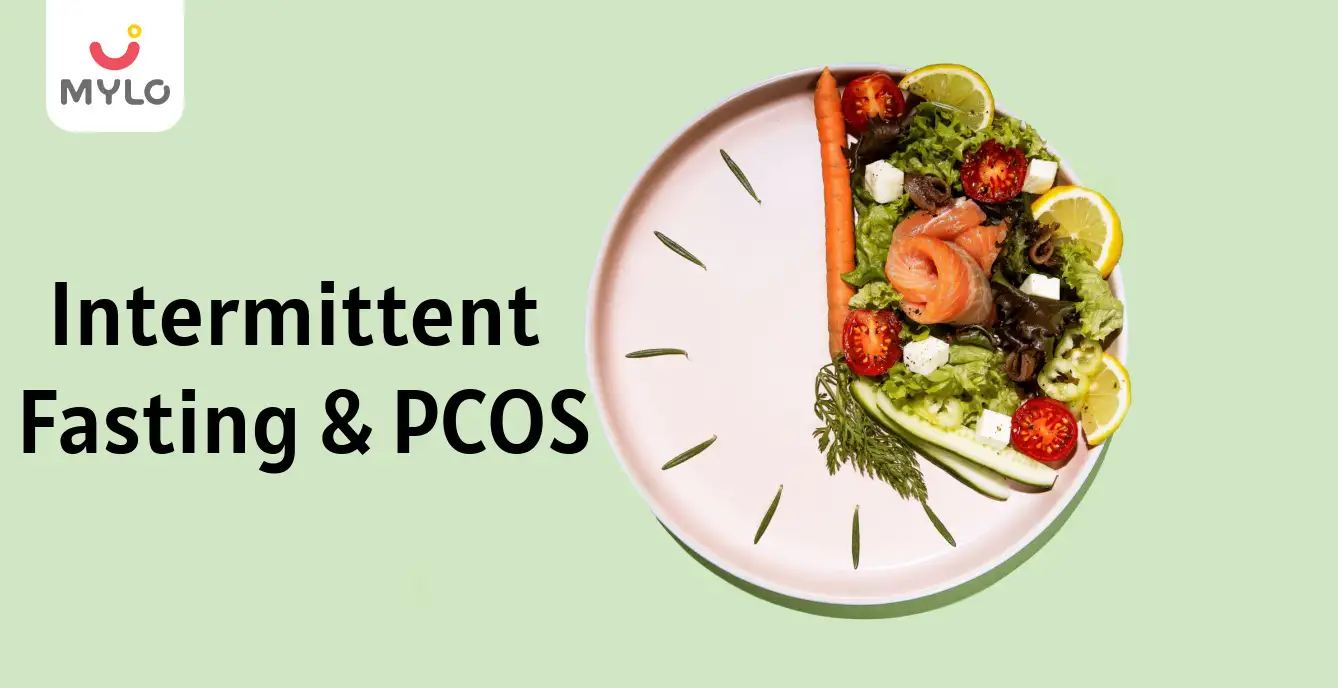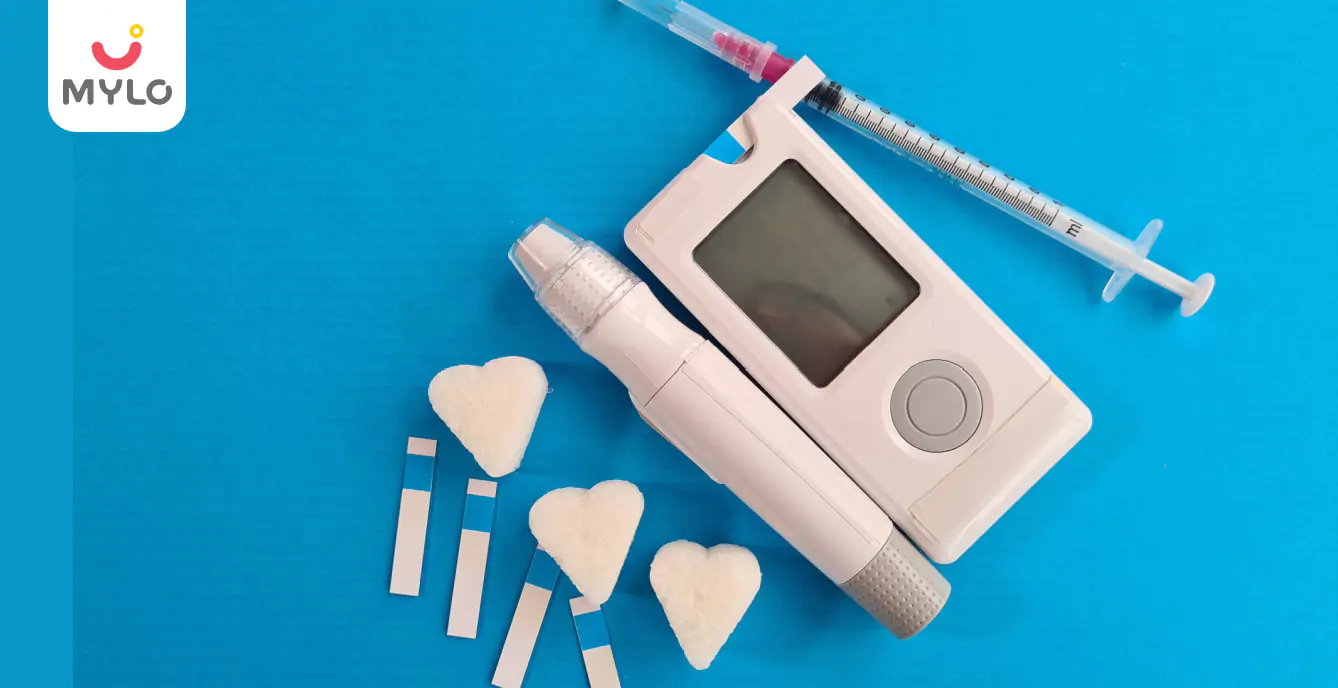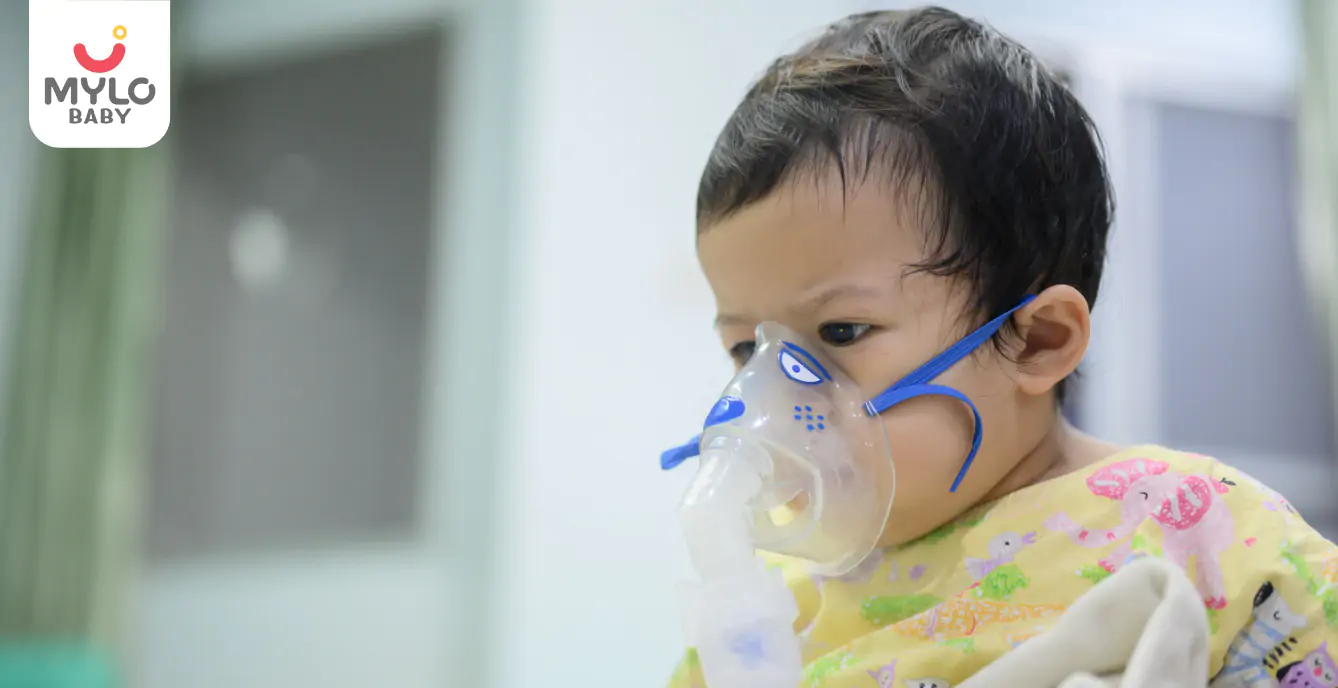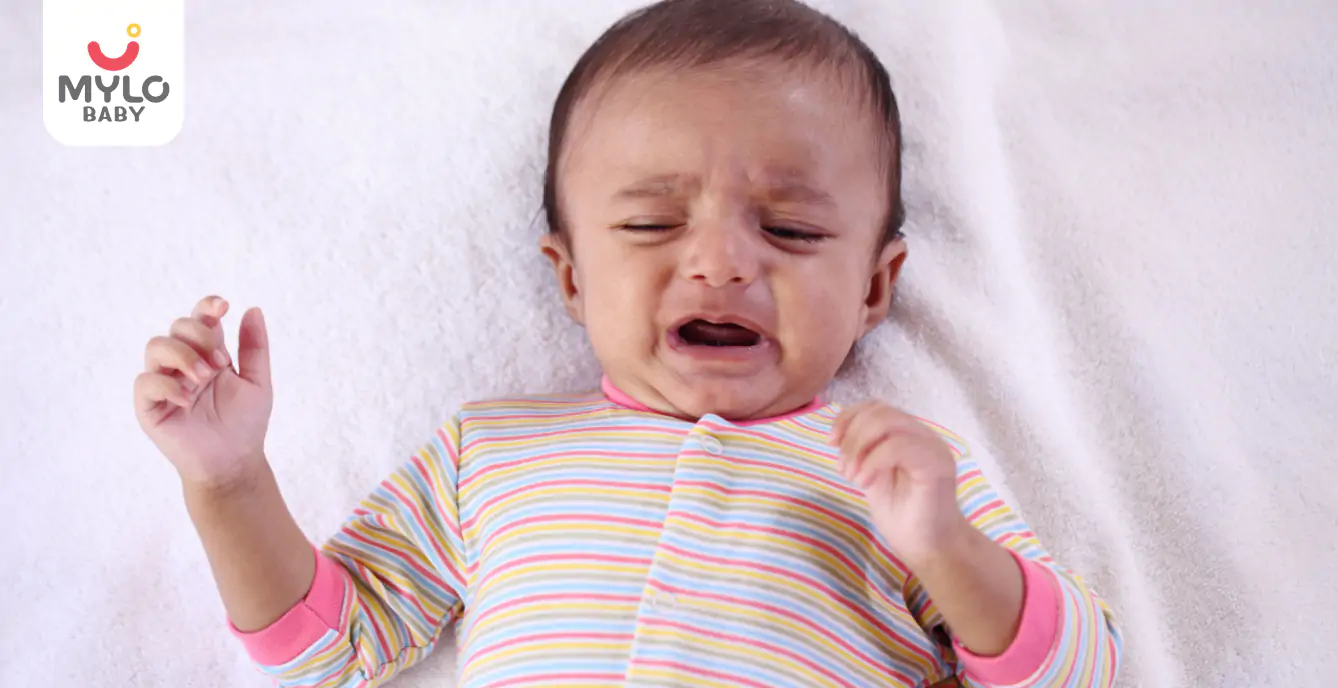Home

PCOS & PCOD

PCOS and Thyroid: Understanding the Complex Relationship and Finding Solutions
In this Article

PCOS & PCOD
PCOS and Thyroid: Understanding the Complex Relationship and Finding Solutions
Updated on 21 December 2023



Medically Reviewed by
Dr. Shruti Tanwar
C-section & gynae problems - MBBS| MS (OBS & Gynae)
View Profile

In recent years, PCOS and thyroid have become increasingly prevalent in women of reproductive age. Interestingly, these two conditions are associated with hormone levels in the body and their imbalance. Consequently, it’s normal to wonder if there’s a relation between these two conditions.
In this article, we will navigate the relationship between PCOS & thyroid disorders, exploring their shared symptoms, underlying causes, and potential treatment options including a PCOS and thyroid Indian diet chart.
What is the Link Between PCOS and Thyroid?
Polycystic ovary syndrome (PCOS) and thyroid disorders are two common endocrine disorders that affect women. While they are separate conditions, there is a complex relationship between PCOS and thyroid function. PCOS is characterized by hormonal imbalances, insulin resistance, and ovarian cysts, while thyroid disorders involve abnormalities in the thyroid gland, which produces hormones that regulate metabolism. The link between the two lies in the impact they have on each other's functioning.
Research suggests that PCOS can disrupt thyroid function by increasing the production of certain hormones, such as estrogen and testosterone, which can interfere with the thyroid's ability to produce and regulate hormones. On the other hand, an underactive thyroid, known as hypothyroidism, can contribute to the development of PCOS by disrupting the balance of hormones involved in ovulation and menstrual cycles.
You may also like: PCOS Hair Loss: The Ultimate Guide to Causes, Treatment and Home Remedies
Symptoms of PCOS & Thyroid
Women with PCOS often experience a range of symptoms, including irregular or absent periods, excessive hair growth, acne, weight gain, and infertility. Additionally, they may have insulin resistance, which can lead to diabetes if not managed properly. Thyroid disorders, on the other hand, can manifest in various ways depending on whether the thyroid is overactive (hyperthyroidism) or underactive (hypothyroidism).
Common symptoms of hyperthyroidism include weight loss, rapid heartbeat, anxiety, and tremors, while hypothyroidism symptoms include fatigue, weight gain, depression, and dry skin.
It is worth noting that some symptoms of PCOS may overlap with those of thyroid, making it challenging to differentiate between the two conditions. These include:
-
Irregular menstrual cycles
-
Excessive hair growth or loss
-
Weight gain
-
Fatigue
-
Changes in mood
Diagnostic Tests for PCOS and Thyroid
To diagnose PCOS, healthcare providers typically consider a combination of symptoms, physical examinations, and blood tests. Blood tests are used to measure hormone levels, such as testosterone and insulin, as well as to check for thyroid abnormalities. Ultrasound imaging may also be performed to visualize the ovaries and identify the presence of cysts.
For thyroid disorders, blood tests are crucial in assessing the levels of thyroid-stimulating hormone (TSH), thyroxine (T4), and triiodothyronine (T3). These tests help determine whether the thyroid is functioning properly and whether medication or other interventions are necessary.
You may also like: PCOS Mood Swings: The Ultimate Guide to Causes and Strategies for Relief
How to Reduce Weight with Thyroid and PCOS?
Weight management can be particularly challenging for individuals with both PCOS and thyroid disorders. However, with the right approach, it is possible to achieve and maintain a healthy weight.
1. Balanced diet
Firstly, adopting a balanced and nutritious diet is essential. A diet rich in whole grains, lean proteins, fruits, and vegetables can help regulate blood sugar levels and support overall health. It is also important to limit the consumption of processed foods, sugary snacks, and beverages high in added sugars.
2. Regular physical activity
Engaging in aerobic exercises, such as brisk walking, swimming, or cycling, can help burn calories and improve insulin sensitivity. Strength training exercises, such as lifting weights or using resistance bands, can also be beneficial in building lean muscle mass, which can boost metabolism.
3. Stress management
Lastly, managing stress levels is imperative as stress can exacerbate symptoms of both the disorders. Engaging in stress-reducing activities like yoga, meditation, or deep breathing exercises can help promote relaxation and overall well-being.
4. Treatment and Management
The treatment and management of PCOS and thyroid disorders may involve a combination of approaches, including medication, lifestyle modifications, and complementary therapies.
In terms of medication, healthcare providers may prescribe hormonal contraceptives to regulate menstrual cycles and reduce androgen levels in PCOS. Thyroid disorders may require medication to normalize thyroid hormone levels, such as levothyroxine for hypothyroidism or anti-thyroid medications for hyperthyroidism.
In addition to medication, lifestyle modifications play a crucial role in managing both conditions. This includes maintaining a healthy weight, eating a balanced diet, exercising regularly, and managing stress levels. Complementary therapies, such as acupuncture, may also be considered to alleviate symptoms and promote overall well-being.
Ayurvedic Medicine for PCOS and Thyroid
Ayurvedic medicine, a traditional system of medicine originating from India, offers holistic approaches to managing these disorders. Ayurveda focuses on restoring balance in the body through dietary modifications, herbal remedies, and lifestyle changes.
Herbs commonly used in Ayurvedic medicine for PCOS include fenugreek, ashwagandha, and shatavari. These herbs are believed to help regulate hormone levels, reduce insulin resistance, and support reproductive health.
Read more about : Ashwagandha
For thyroid disorders, herbs like guggul, kanchanara, and punarnava are often recommended to improve thyroid function and balance hormone levels. However, it is important to consult with an Ayurvedic practitioner before starting any herbal remedies.
Read more about : Shatavari
PCOS and Thyroid Indian Diet Chart
Adopting a balanced diet can be beneficial for individuals with PCOS and thyroid disorders. Including a variety of whole grains, legumes, fruits, vegetables, lean proteins, and healthy fats can help regulate blood sugar levels, support thyroid function, and manage weight.
Here is a sample Indian diet chart:
1. Breakfast
Vegetable omelette with whole wheat toast and a cup of herbal tea.
2. Mid-morning snack
A handful of mixed nuts.
3. Lunch
Quinoa pulao with mixed vegetables, dal, and a side of cucumber raita.
4. Afternoon snack
Greek yogurt with berries.
5. Dinner
Grilled chicken/fish with sautéed spinach and brown rice.
6. Evening snack
Roasted chickpeas or roasted makhana (fox nuts).
7. Before bed
A cup of warm turmeric milk.
Remember to consult with a registered dietitian or nutritionist to personalize the diet chart according to your specific needs and preferences.
Home Remedies for PCOS and Thyroid
In addition to Ayurvedic medicine for PCOS and thyroid, there are several home remedies that can help alleviate their symptoms.
For PCOS, consuming foods rich in omega-3 fatty acids, such as fatty fish, flaxseeds, and walnuts, may help reduce inflammation and improve hormone balance. Spearmint tea has also been shown to have anti-androgenic effects, potentially reducing excessive hair growth and acne associated with PCOS.
For thyroid disorders, incorporating foods rich in iodine, such as seaweed, iodized salt, and seafood, can support healthy thyroid function. Consuming foods high in selenium, such as Brazil nuts, sunflower seeds, and tuna, may also be beneficial.
Furthermore, avoiding foods known to interfere with thyroid function, such as soy products and cruciferous vegetables (broccoli, cauliflower, etc.), can be helpful.
Key Takeaways
PCOS and thyroid are complex conditions that can have a significant impact on a woman's health and well-being. It is important to consult with healthcare professionals to receive an accurate diagnosis and develop a comprehensive plan that may include medication, lifestyle modifications, and complementary therapies. By taking a holistic approach, women can improve their overall health and quality of life.
References
1. Palomba S, Colombo C, Busnelli A, Caserta D, Vitale G. (2023). Polycystic ovary syndrome and thyroid disorder: a comprehensive narrative review of the literature. Front Endocrinol (Lausanne).
2. Singla R, Gupta Y, Khemani M, Aggarwal S. (2015). Thyroid disorders and polycystic ovary syndrome: An emerging relationship. Indian J Endocrinol Metab.
3. Du D, Li X. (2013). The relationship between thyroiditis and polycystic ovary syndrome: a meta-analysis. Int J Clin Exp Med.





Medically Reviewed by
Dr. Shruti Tanwar
C-section & gynae problems - MBBS| MS (OBS & Gynae)
View Profile


Written by
Anupama Chadha
Anupama Chadha, born and raised in Delhi is a content writer who has written extensively for industries such as HR, Healthcare, Finance, Retail and Tech.
Read MoreGet baby's diet chart, and growth tips

Related Articles
Related Questions
Influenza and boostrix injection kisiko laga hai kya 8 month pregnancy me and q lagta hai ye plz reply me

Hai.... My last period was in feb 24. I tested in 40 th day morning 3:30 .. That is faint line .. I conculed mylo thz app also.... And I asked tha dr wait for 3 to 5 days ... Im also waiting ... Then I test today 4:15 test is sooooo faint ... And I feel in ma body no pregnancy symptoms. What can I do .

Baby kicks KB Marta hai Plz tell mi

PCOD kya hota hai

How to detect pcos

Related Topics
RECENTLY PUBLISHED ARTICLES
our most recent articles

PCOS & PCOD
Intermittent Fasting & PCOS: The Ultimate Guide to Benefits, Risks and Precautions

PCOS & PCOD
Insulin Resistance & PCOS: A Comprehensive Guide to Causes and Management

Breathlessness
Your heart stops beating when your baby feels breathless! Here are 5 things to know about infant breathlessness.

Care for Baby
Newborn Crying: What It Means and How to Handle It?

Growth & Development
When Do Babies Make Eye Contact: Keeping an Eye on Important Milestones

Women Interests
Is your baby getting breathless frequently? Five things you must know
- 50 Budget-Friendly Birthday Return Gift Ideas to Wow Your Guests
- PCOS Exercise: Your Guide to Sweating Away PCOS
- PCOS and Pregnancy: How to Manage PCOS on the Path to Parenthood
- PCOS Tests: The Power of Diagnostic Tests in Your Health Journey
- Must-Read Ruskin Bond Short Stories for Little Minds
- The Top 10 Tenali Raman Stories You Must Read to Your Kids
- Ovulation Bleeding: The Ultimate Guide to Causes, Symptoms and Management
- A Guide to Recognizing Symptoms of Ovulation After HCG Injection
- Bulky Ovaries Explained: What Every Woman Should Be Aware Of
- Ovulation: The Key to Maximizing Your Chances of Conception and Pregnancy
- The Ultimate Compilation of Fancy Dress Ideas for Young Kids
- How Long Does Sperm Take to Reach the Egg?
- Pregnancy Symptoms After Ovulation Day by Day: Exploring the Daily Progression
- Signs Ovulation is Over: Your Guide to Understanding the End of Ovulation


AWARDS AND RECOGNITION

Mylo wins Forbes D2C Disruptor award

Mylo wins The Economic Times Promising Brands 2022
AS SEEN IN
















- Mylo Care: Effective and science-backed personal care and wellness solutions for a joyful you.
- Mylo Baby: Science-backed, gentle and effective personal care & hygiene range for your little one.
- Mylo Community: Trusted and empathetic community of 10mn+ parents and experts.
Product Categories
baby carrier | baby soap | baby wipes | stretch marks cream | baby cream | baby shampoo | baby massage oil | baby hair oil | stretch marks oil | baby body wash | baby powder | baby lotion | diaper rash cream | newborn diapers | teether | baby kajal | baby diapers | cloth diapers |




